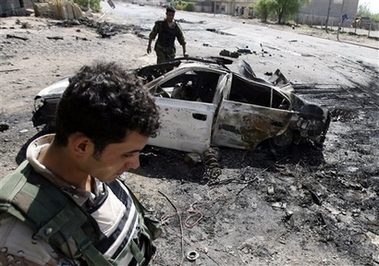Man arrested in Iraqi sheik's killing
Updated: 2007-09-17 09:21
BAGHDAD - The US military on Sunday announced the arrest of a suspect in the killing of a sheik who spearheaded the US-backed Sunni revolt against al-Qaida in Iraq, even as the terror network launched a campaign of violence during the Islamic holy month of Ramadan.
 Iraqi Army soldiers investigate the site of a car bomb attack in the Mansour neighborhood, western Baghdad, Iraq, Sunday, Sept. 16, 2007. The blast killed at least one civilian and wounded five, police said. [AP] |
Dozens of suspected Sunni insurgents raided Shiite villages north of Baghdad, killing at least 15 people and setting homes ablaze, police said. A bicycle bomb exploded at a cafe serving tea and food during the Ramadan fast in northern Iraq.
The surge of bloodshed - with 54 people killed or found dead nationwide - occurred a day after al-Qaida announced a new campaign aimed at countering US and Iraqi claims the terror movement is reeling following the US-led offensives around the Iraqi capital.
But the US military insisted it had the group on the run and said a man believed responsible for the assassination of a US-allied Sunni tribal leader in Anbar province had been arrested north of Baghdad.
Abdul-Sattar Abu Risha, 37, was the leader of Anbar Awakening - an alliance of clans backing the Iraqi government and US forces against al-Qaida in Iraq that was touted as one of the success stories of the war. He and three companions were killed in a bombing Thursday outside his heavily guarded compound in the provincial capital of Ramadi, days after he had met with President Bush.
The US military said an al-Qaida-linked militant connected to his death and a plot to kill other tribal leaders - Fallah Khalifa Hiyas Fayyas al-Jumayli, an Iraqi also known as Abu Khamis - was seized Saturday during a raid west of Balad, and the search continued for other suspects.
Brig. Gen. Joe Anderson, chief of staff to the No 2 commander in Iraq, said al-Qaida fighters were "off-balance" and had "clearly been neutralized" in Baghdad.
"They are very fractured. It's very localized and the ability for them to conduct large-scale, sensational attacks has been greatly decreased," Anderson said at a news conference.
In the raids on the Shiite villages of Jichan and Ghizlayat, the fighters arrived from several different directions and residents fought back until Iraqi security forces arrived and forced the attackers to flee to nearby farms.
|
|
|
||
|
||
|
|
|
|

